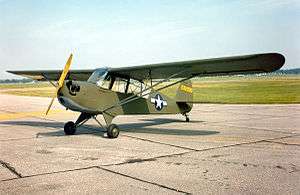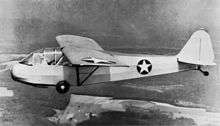Aeronca L-3
| L-3 Grasshopper | |
|---|---|
 | |
| Aeronca L-3B belonging to the National Museum of the United States Air Force. | |
| Role | Observation and liaison aircraft |
| Manufacturer | Aeronca Aircraft |
| First flight | 1941 |
| Primary user | United States Army Air Forces |
The Aeronca L-3 group of observation and liaison aircraft were used by the United States Army Air Corps in World War II. The L-3 series were adapted from Aeronca's pre-war Tandem Trainer and Chief models.
Design and development
In 1941, the United States Army Air Corps ordered four examples of the Aeronca 65 TC Defender, designated YO-58, for evaluation of the suitability of light aircraft for observation and liaison purposes. (It also placed similar orders with Piper and Taylorcraft Aircraft). Service tests during the US Army's annual maneuvers proved successful, and resulted in large orders being placed. In 1942, the O-58 was redesignated L-3.[1][2]
When American forces went into combat after Pearl Harbor, the Army Air Force used the L-3 in much the same manner as observation balloons were used during World War I—spotting activities and directing artillery fire. It was also used for liaison and transport duties and short-range reconnaissance which required airplanes to land and take off in short distances from unprepared landing strips. Liaison pilots would train on L-3s before moving on to front-line aircraft like the Piper L-4 or the Stinson L-5. Some L-3s were shipped to north Africa, and subsequently given to the Free French Forces in the area at the time. At least one of the aircraft served with US forces in Italy.And minimally one other did service in Normandy, as reported by the Detroit Free Press on 25 June 1944, with a photograph indicating transport of medical supplies to the advancing front-line regiments.
The TG-5 was a three-seat training glider of 1942 based upon the O-58 design. This aircraft retained the O-58's rear fuselage, wings, and tail while adding a new front fuselage in place of the engine. In all, Aeronca built 250 TG-5 gliders for the Army. The Navy received three as the LNR-1.[3]
Variants

O-58 designation replaced by L-3 designation in April 1942[4]
- YO-58 – Four aircraft with a 65 hp (48 kW) Continental YO-170-3 engine.[4]
- O-58 / L-3 – production order of 50, most used for training in the US.[4]
- O-58A / L-3A – Fuselage widened four inches and extended greenhouse canopy. 20 built.[4]
- O-58B / L-3B – Modified canopy and additional radio equipment. 875 built.[4]
- O-58C / L-3C – As O-58B/L-3B but with radio equipment removed for use as trainer. 490 built.[4]
- L-3D – Aeronca 65TF Defender. 11 aircraft impressed.[4]
- L-3E – Aeronca 65TC Defender. 12 aircraft impressed.[4] Continental engine.
- L-3F – Aeronca 65CA Defender. 19 aircraft impressed.[4]
- L-3G – Aeronca 65L Super Chief with side by side seating. 4 aircraft impressed.[4] Lycoming engine.
- L-3H – Aeronca 65TL Defender. 1 aircraft impressed)[4] Lycoming engine.
- L-3J – Aeronca 65TC Defender 1 additional aircraft impressed.[4] Continental engine.
- JR-1 – Three L-3Cs supplied to the US Navy.[4]
- TG-5 – 250 were built as training gliders for the USAAC.[4]
- TG-33 – TG-5 converted for prone pilot.[4][5]
- LNR – Three TG-5s supplied to the US Navy.[4]
Operators
- Brazilian Air Force L-3C
30 L-3B delivered to Chile via Lend-Lease program in 1943, all delivered to civil aero clubes. 4 Survivors (CC-KGA at La Ligua, CC-SHA at Chile's Aviation Museum. Two examples in the hands of restorers at Tobalaba airfield, Santiago, and Los Angeles.
- Aviación Militar – received three L-3Bs.[6]
Surviving aircraft
Aside from 15 L-3s (2 L-3, 7 L-3B, and 6 L-3C) that remain on the US civil registry as of June 2016,[7] a number have also found their way into museums
- 42-7798 – O-58A airworthy with Blake W. Henderson of Westmoreland, Tennessee.[8]
- 42-14773 – L-3 airworthy with Audie L. Hollon of Milan, Missouri.[9][10]
- 42-36152 – O-58B airworthy with Lee H. Montgomery in Corsicana, Texas. Previously with the Alamo Liaison Squadron in San Antonio, Texas.[11][12][13]
- 42-36200 – L-3B on static display at the National Museum of the United States Air Force at Wright-Patterson AFB near Dayton, Ohio.[14][15]
- 43-1844 – O-58B airworthy at the Port Townsend Aero Museum in Port Townsend, Washington.[16][17][18]
- 43-26772 – L-3B on static display at the Air Zoo in Kalamazoo, Michigan.[19][20]
- 43-26819 – L-3B on static display at the Museo Nacional Aeronáutico y del Espacio in Santiago, Chile.[21]
- Unknown – L-3B on static display at the Museum of Flight in Seattle, Washington.[22]
- Unknown – L-3B airworthy at the Cavanaugh Flight Museum in Addison, Texas.[23][24]
- Unknown – L-3 airworthy at the Wings of Eagles Discovery Center in Elmira, New York.[25][26]
- Unknown – L-3 on display at the Vintage Flying Museum in Fort Worth, Texas.[27]
- Unknown – L-3B airworthy at the Western Antique Aeroplane & Automobile Museum in Hood River, Oregon.[28][29][30]
- Unknown – L-3E airworthy with Air Group One of the Commemorative Air Force in El Cajon, California.[31][32]
- Unknown – L-3E under restoration with the Spirit of Tulsa of the Commemorative Air Force in Tulsa, Oklahoma.[33][34]
- Unknown – L-3E airworthy with the Missouri Wing of the Commemorative Air Force in Portage Des Sioux, Missouri.[35][36]
- Unknown – O-58B airworthy with Nicholas S. Kapotes of Pompton Plains, New Jersey.[37]
- 43-26861 – O-58B (L-3B) airworthy with James S. Tate of Nashville, Tennessee.[38]
- Unknown – L-3 on static display at the National D-Day Memorial in Bedford, Virginia.[39]
- O58B-8272 – O-58B airworthy at Silver Creek Airport (NC52) in Morganton, NC.[40]
Specifications (L-3C)
Data from Jane's Fighting Aircraft of World War II.[41]
General characteristics
- Crew: 2: pilot, observer
- Length: 21 ft 10 in (6.67 m)
- Wingspan: 35 ft 0 in (10.67 m)
- Height: 9 ft 1 in (2.74 m)
- Wing area: 169 ft² (15.6 m²)
- Empty weight: 835 lb (379 kg)
- Loaded weight: 1,260 lb (572 kg)
- Powerplant: 1 × Continental O-170-3 OR a Continental O-65-8 flat-4 engine, 65 hp (48 kW)
Performance
- Maximum speed: 87 mph (76 kn, 139 km/h)
- Cruise speed: 79 mph (69 kn, 126 km/h)
- Stall speed: 46 mph (40 kn, 73 km/h)
- Range: 218 mi (189 nmi, 350 km)
- Service ceiling: 10,000 ft (3,050 m)
- Wing loading: 7.45 lb/ft² (36.1 kg/m²)
- Power/mass: .051 hp/lb (85 W/kg)
See also
Related development
Aircraft of comparable role, configuration and era
Related lists
Notes
- ↑ Swanborough and Bowers 1963, p. 31.
- ↑ Mondey 1996, p. 8.
- ↑ Swanborough and Bowers 1963, pp. 32–33.
- 1 2 3 4 5 6 7 8 9 10 11 12 13 14 15 16 Adcock, 2005, p.21
- ↑ Swanborough and Bowers 1963, p.584.
- ↑ Air International September 1973, p. 121.
- ↑ FAA Registry Search for Aeronca L-3 accessed 12 June 2016
- ↑ "FAA REGISTRY [N46513]". Federal Aviation Administration. U.S. Department of Transportation. Retrieved 6 December 2016.
- ↑ "Airframe Dossier – Aeronca L-3 Grasshopper, s/n 42-14773 USAAF, c/r N4209K". Aerial Visuals. AerialVisuals.ca. Retrieved 6 December 2016.
- ↑ "FAA REGISTRY [N4209K]". Federal Aviation Administration. U.S. Department of Transportation. Retrieved 6 December 2016.
- ↑ "Alamo Liaison Squadron Picture Gallery". The Alamo Liaison Squadron. Alamo Liaison Squadron. Retrieved 6 December 2016.
- ↑ "Airframe Dossier – Aeronca O-58B Grasshopper, s/n 42-36152 USAAF, c/n 058B-1782, c/r N52169". Aerial Visuals. AerialVisuals.ca. Retrieved 6 December 2016.
- ↑ "FAA REGISTRY [N52169]". Federal Aviation Administration. U.S. Department of Transportation. Retrieved 6 December 2016.
- ↑ "Aeronca L-3B "Grasshopper"". National Museum of the US Air Force. 17 April 2015. Retrieved 6 December 2016.
- ↑ "Airframe Dossier – Aeronca L-3B Grasshopper, s/n 42-36200 USAAF". Aerial Visuals. AerialVisuals.ca. Retrieved 6 December 2016.
- ↑ "Aeronca L3 "Grasshopper"". Port Townsend Aero Museum. Retrieved 6 December 2016.
- ↑ "Airframe Dossier – Aeronca O-58B Grasshopper, s/n 43-1844 USAAF, c/r N48145". Aerial Visuals. AerialVisuals.ca. Retrieved 6 December 2016.
- ↑ "FAA REGISTRY [N48145]". Federal Aviation Administration. U.S. Department of Transportation. Retrieved 6 December 2016.
- ↑ "Aeronca L-3B Defender". Air Zoo. Air Zoo. Retrieved 6 December 2016.
- ↑ "Airframe Dossier – Aeronca L-3B Grasshopper, s/n 43-26772 USAAF, c/n 058B-9093, c/r N47139". Aerial Visuals. AerialVisuals.ca. Retrieved 6 December 2016.
- ↑ "Airframe Dossier – Aeronca L-3B Grasshopper, s/n 43-26819 USAAC, c/n 58B 9563, c/r CC-SHA". Aerial Visuals. AerialVisuals.ca. Retrieved 6 December 2016.
- ↑ "Aeronca L-3B Grasshopper". The Museum Of Flight. The Museum Of Flight. Retrieved 6 December 2016.
- ↑ "Aircraft". Cavanaugh Flight Museum. Archived from the original on 2016-10-29. Retrieved 6 December 2016.
- ↑ "FAA REGISTRY [N47373]". Federal Aviation Administration. U.S. Department of Transportation. Retrieved 6 December 2016.
- ↑ "Aeronca L3 (Grasshopper)". Wings of Eagles Discovery Center. Wings of Eagles Discovery Center. Archived from the original on 2016-06-29. Retrieved 6 December 2016.
- ↑ "FAA REGISTRY [N33769]". Federal Aviation Administration. U.S. Department of Transportation. Retrieved 6 December 2016.
- ↑ "Our Collection". Vintage Flying Museum. Retrieved 6 December 2016.
- ↑ "Aeronca L-3B Grasshopper". Western Antique Aeroplane & Automobile Museum. WAAAM. Retrieved 6 December 2016.
- ↑ "Airframe Dossier – Aeronca O-58B Grasshopper, c/r N47751". Aerial Visuals. AerialVisuals.ca. Retrieved 6 December 2016.
- ↑ "FAA REGISTRY [N47751]". Federal Aviation Administration. U.S. Department of Transportation. Retrieved 6 December 2016.
- ↑ "1941 L-3B Grasshopper". Air Group One. Air Group One CAF. Retrieved 6 December 2016.
- ↑ "FAA REGISTRY [N36687]". Federal Aviation Administration. U.S. Department of Transportation. Retrieved 6 December 2016.
- ↑ "CAF Ghost Squadron- The Liaison/Observation Aircraft". Commemorative Air Force Headquarters. Commemorative Air Force. Retrieved 6 December 2016.
- ↑ "FAA REGISTRY [N27336]". Federal Aviation Administration. U.S. Department of Transportation. Retrieved 6 December 2016.
- ↑ "L3 "Lil' Show Me"". Commemorative Air Force – Missouri Wing. Commemorative Air Force – Missouri Wing. Retrieved 6 December 2016.
- ↑ "FAA REGISTRY [N36681]". Federal Aviation Administration. U.S. Department of Transportation. Retrieved 6 December 2016.
- ↑ "FAA REGISTRY [N46248]". Federal Aviation Administration. U.S. Department of Transportation. Retrieved 6 December 2016.
- ↑ "FAA REGISTRY [N48441]". Federal Aviation Administration. U.S. Department of Transportation. Retrieved 6 December 2016.
- ↑ "Airframe Dossier – Aeronca50/65 / L-3 Champion / LNR / O-58 / TG-5 / TG-33, c/n 16645". Aerial Visuals. AerialVisuals.ca. Retrieved 6 December 2016.
- ↑ "Aircraft Data N49705, 1942 Aeronca 0-58B C/N 058B-8272". www.airport-data.com. Retrieved 2017-12-03.
- ↑ Bridgeman, Leonard. "The Aeronca Grasshopper." Jane's Fighting Aircraft of World War II. London: Studio, 1946. p. 203–204. ISBN 1 85170 493 0.
References
- Adcock, Al (2005). US Liaison Air in Action – Aircraft Number 195. Carrollton, Texas: Squadron Signal Publications. pp. 21–24. ISBN 0-89747-487-2.
- Andrade, John M. (1979). U.S. Military Aircraft Designations and Serials Since 1909. Midland Counties Publications. ISBN 0-904597-22-9.
- Abel, Alan (2001). Aeronca's Golden Age. Wind Canyon Books. ISBN 1-891118-42-0.
- Guillemette, Roger. "Aeronca L-3". US Centennial of Flight Commission. Archived from the original on 4 January 2006. Retrieved 2006-01-04.
- Mondey, David (1996). The Concise Guide to American Aircraft of World War II. London: Chancellor Press. ISBN 185152-706-0.
- Swanborough, F.G.; Peter M. Bowers (1963). United States Military Aircraft since 1909. London: Putnam.
- "Venezuela Refurbishes Her Aerial Sombrero". Air International. 5 (3): 118–124, 150. September 1973.
- "Aeronca L-3 Aircraft Finder". AeroWeb: The Aviation Enthusiast Corner. City University of New York. Archived from the original on 2006-01-18. Retrieved 2006-01-04.
External links
| Wikimedia Commons has media related to Aeronca L-3 Grasshopper. |
- L-3 page at the National Museum of the United States Air Force
- L-3 page at Warbird Alley
- L-3 page at Museo Nacional Aeronáutico y del Espacio de Chile